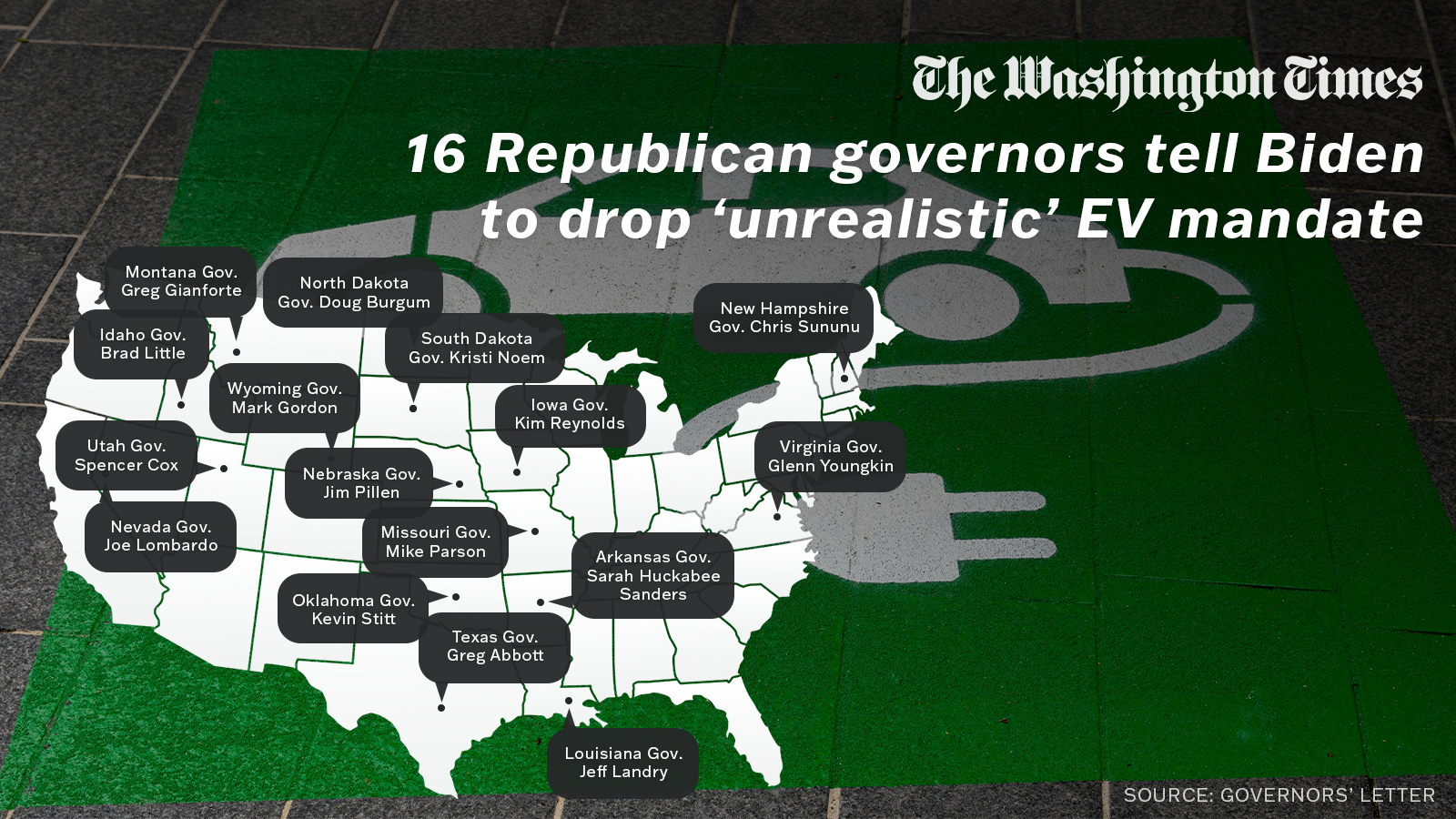Republican governors have called on President Biden to reverse course on a proposed climate-change mandate requiring two-thirds of new auto sales to be electric vehicles by 2032.
Even with price cuts and tax credits for manufacturers and consumers, governors from 16 states told Mr. Biden in a letter Monday that the proposed mandate is “unrealistic, costly and [imposes] prescriptive solutions that harm American consumers.”
“While we are not opposed to the electric vehicle marketplace, we do have concerns with federal government mandates that penalize retailers and do not reflect the will of the consumer,” the governors wrote. “The American customer should be able to decide what technology makes most sense for them, not the federal government.”
The White House did not immediately respond to a request for comment.
The governors’ message mirrored the concerns among automakers and car dealerships that drivers are not willing to make such a rapid transition, forcing the industry to slash EV output due to sluggish demand, despite the administration’s potential mandate.

In addition to costs, the governors cited concerns about grid reliability and national security concerns that a hasty shift could further bolster dependency on China, which dominates critical-minerals production used in EV batteries.
“While battery electric vehicles are a promising technology, we believe it will take time to develop the marketplace, to address consumer access and concerns, and to build out the necessary infrastructure,” the governors said.
The Environmental Protection Agency is weighing stringent tailpipe emissions rules that would require two-thirds of new cars sold by 2032 to be EVs, but the decision is not yet final. The proposal is a pillar of Mr. Biden’s green energy agenda, which administration officials contend is feasible because of tax credits from the Inflation Reduction Act that include up to $7,500 for EV buyers.
In addition to the likely federal mandate, more than a dozen Democratic-run states have policies to phase out new gas-powered cars altogether by 2035.
However, based on recent yearly trends, it would take more than two decades to achieve the Biden administration’s proposed threshold. Nearly 4,000 car dealerships recently urged Mr. Biden to delay the timeline due to EVs “stacking up on our lots.”
Electric vehicles accounted for an all-time high of 7.9% of auto sales in the third quarter last year, and were less than 6% in all of 2022, according to Cox Automotive.
A lack of nationwide EV charging stations, limited battery range and higher sticker prices are the leading causes for Americans’ hesitancy to go green. Deep freezes across the U.S. this winter created EV horror stories of stranded drivers with batteries that wouldn’t properly charge, fueling arguments from critics that the technology isn’t ready for primetime.
As part of Mr. Biden’s mandates for federal agencies, the U.S. Postal Service unveiled Monday its first charging station and the first of 66,000 EV delivery vehicles it plans to acquire.
In their letter to Mr. Biden, the Republican governors pleaded for a “more realistic approach” driven by the free market “rather than the federal government.”
“Let American consumers decide for themselves,” they said.
Those who signed the letter were Virginia Gov. Glenn Youngkin, Texas Gov. Greg Abbott, Arkansas Gov. Sarah Huckabee Sanders, New Hampshire Gov. Chris Sununu, North Dakota Gov. Doug Burgum, South Dakota Gov. Kristi Noem, Iowa Gov. Kim Reynolds, Idaho Gov. Brad Little, Louisiana Gov. Jeff Landry, Missouri Gov. Mike Parson, Montana Gov. Greg Gianforte, Nebraska Gov. Jim Pillen, Nevada Gov. Joe Lombardo, Oklahoma Gov. Kevin Stitt, Utah Gov. Spencer Cox and Wyoming Gov. Mark Gordon.
• Ramsey Touchberry can be reached at rtouchberry@washingtontimes.com.




Please read our comment policy before commenting.